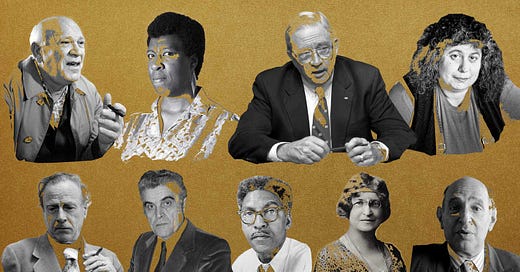
The Free Press

Earlier this year, The Free Press ran a series entitled The Prophets—about thinkers whose “words, work, and life illuminated something essential about the increasingly strange times we find ourselves in today,” as the series’ editor Emily Yoffe put it. In her epilogue to the series, Emily asked readers to tell us: Who did we miss? Here’s a selection of our favorite suggestions.
Gillian Rose
The British philosopher Gillian Rose was a merciless critic of intellectual laziness, and the best demolisher of poststructuralist posturing I know. She scorned the infiltration of fixed identity categories into thought because, as she put it, “If I knew who or what I were, I would not write. I write out of those moments of anguish which are nameless.”
After Rose was diagnosed with ovarian cancer, she wrote a best-selling memoir, Love’s Work, which details her battle with cancer, love affair with philosophy, and life affair, as it were, with love. It’s a remarkable final testament from a thinker who foresaw our current onslaught of anti-rational moral crusading and called on philosophy to be a bulwark against it. —Josh Tolle
Ivan Illich
The Austrian priest and philosopher Ivan Illich was way ahead of his time—on education, in Deschooling Society, and in his book Gender, which had the uber-elite California feminists of the ’70s in an uproar. And in Limits to Medicine, he argues that medicine has become a tool of social control and has created a “culture of illness,” which more often than not harms individuals and communities. He examined the unintended consequences of medical intervention, such as iatrogenic illness, and advocated for a shift toward community-based care and a rejection of the medicalization of everyday life. —JP Misheff
F. A. Hayek
He saw where socialism was headed by its very nature. He pointed to the problems with “social justice” and other phrases co-opted by the left. And he explained the connection between free markets and wealth. These are messages largely forgotten by both the left and the right today.
—Bill Stewart
Ray Kurzweil
He first made his prediction that artificial intelligence will achieve human-level intelligence by 2029 back in 1999. His writing on AI and exponential growth are amazingly accurate. —Craig Hill
Walker Percy
In his picaresque 1971 novel Love in the Ruins, Walter Percy essentially predicted the state of U.S. society today, with all its divisions and social ills. But while highly critical of where things were going, he was never sanctimonious: the novel’s fairly autobiographical hero, Dr. Tom Moore, is an alcoholic, womanizing depressive—but also a brilliant scientist and a lovable man. Percy’s writing is felicitous, comic, and very serious all at the same time. —Bill Crimmins
Ending a marriage has been rebranded as the path to female self-empowerment. So argued Kat Rosenfield in our Saturday essay, “Does Divorce Make You Hotter?” Kat’s piece inspired dozens of you to write in with your own views on divorce and marriage.
One reader helped make it quicker for victims of domestic violence to get divorced in D.C.—a campaign that succeeded earlier this year. But her view of marriage might surprise you:
It’s unfortunate that people view marriage in such an awful way. Those of us who had to get divorced due to domestic violence often wish with every fiber of our being that we could be in a happy or functioning marriage.
I went to Wellesley College in the ’90s and saw a similar mentality among some of my female classmates—how men are disposable and just bad humans simply because they’re male. I thought it was just immaturity but some of my female professors were also very public about their hatred toward men. (I have five brothers who I think are the coolest, and my parents have been married for over 50 years.)
Feminism, for me, is standing up for women and individuals who can’t stand up for themselves, which is why I helped to change the divorce laws in D.C. My divorce was so unnecessarily difficult, and I didn’t want another person to have to go through the same thing. It’s a bittersweet win because women like me often don’t want to get divorced. We want to stay married. I want to put my 50 years in with a husband.
—Elaine Rigas
One counselor wrote in to tell us:
This essay hits close to home because I am a social worker and see many couples. Sometimes I think it’s easier for people to knee-jerk to overgeneralization (“the whole institution is toxic”) as opposed to sitting with the nuanced discomfort of assessing what they contributed to their own unhappiness. Humility is a value that is essential for both spouses to possess in a healthy marriage and that seems incompatible with “badass” divorcée rings, in my humble opinion. —JT
One detail from Kat’s piece, which she said was emblematic of the contemporary celebration of divorce, was the trend toward getting wedding rings recast as “divorce rings.” But one reader told us this was nothing new:
In 1979, I used the gold from my engagement ring to purchase a new setting for the diamond for what was called a liberation or freedom ring.
The jury is still out on whether the Antisemitism Awareness Act, passed in the House on May 1, is a threat to free speech. Last month, Christopher Rufo and Jenin Younes argued in these pages that the goal of the bill—to prohibit discrimination against Jewish students and employees on campus—is “noble,” but it is nevertheless a threat to First Amendment rights.
In response, Ilya Shapiro, director of Constitutional Studies at the Manhattan Institute, wrote to tell us he disagreed. Among other things, he emphasized that: “The statutory text explicitly says ‘Nothing in this Act shall be construed to diminish or infringe upon any right protected under the First Amendment to the Constitution of the United States.’ ”
Here, Jenin Younes replies:
Many thanks to Ilya Shapiro for his thought-provoking and collegial response. Ilya dismisses our concerns on the grounds that the proposed law will not punish protected speech, in part because the text includes a disclaimer.
But one of the foremost concerns, when it comes to these protections, is the chilling effect a law will have on the open exchange of ideas. Most college students are not First Amendment experts. For fear of punishment, they may refrain from, for example, condemning the actions of the Israeli government. Likewise, it is foreseeable that instructors will choose to avoid the topic rather than risk reprisal for assigning books or holding discussions.
If the House of Representatives, which passed this bill, truly wanted to protect free speech, while ensuring that Jewish students are not subject to unlawful discrimination, it could merely affirm that Jewish people are a group protected by Title VI of the Civil Rights Act.
Thus, I see the Act as a cynical ploy to stifle debate, while purporting to care about Americans’ First Amendment free speech rights. The Senate, which is currently considering this bill, should decline to pass it.
Do you have a unique perspective on a Free Press story? Can you bring your personal experience or expertise to bear on an issue we cover? We want to hear from you. Send us a letter to the editor: letters@thefp.com.
Become a Free Press subscriber today:

















to Jenin Younes:
When, long time ago in USSR, I was heading to the school and bunch of boys were following me and derated with antisemitic troupes: jews stinks, jews are rascals, jews are cowards, jews are greedy..... Is this protected by First Amendment speech? After all they did not beat me up so they certainly traumatized me. Too often the conduct is being considered as opinion. The X note or article in the magazine or movie and even the speaker event can be ignored. I do not have to read or watch them or go to that event. But how the demonstration with the loudspeakers barring my way can be considered as the protected speech I cannot fathom. Where is my right to avoid it? Not to be traumatized by it
I must have missed Emily Yoffe's request for additional prophets, so I'll do it here: Julian Simon, author of "The Ultimate Resource", anti-catastrophist and believer in humanity. Also the winner of the famous bet with Paul Ehrlich. Speaking of whom what is the opposite of a prophet? Whatever it is, the accompanying photo is of Paul Ehrlich.